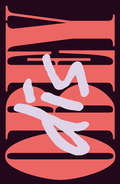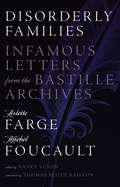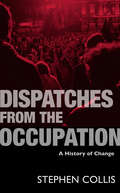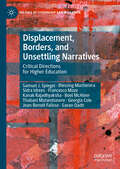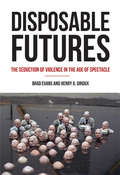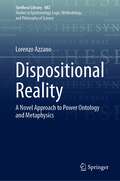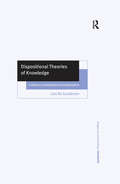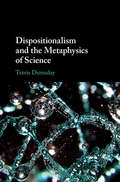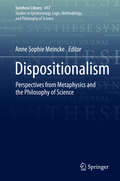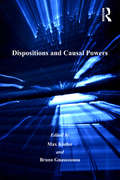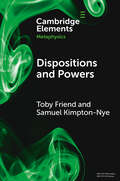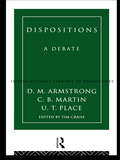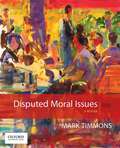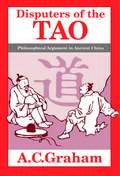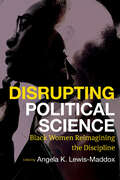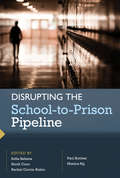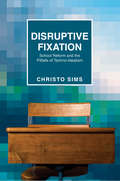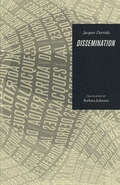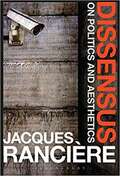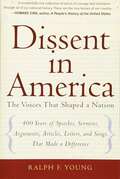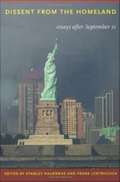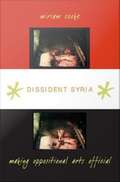- Table View
- List View
Disobey: A Philosophy of Resistance
by Frederic GrosExploring the philosophy of disobedienceThe world is out of joint, so much so that disobeying should be an urgent question for everyone. In this provocative essay, Frédéric Gros explores the roots of political obedience. Social conformity, economic subjection, respect for authorities, constitutional consensus? Examining the various styles of obedience provides tools to study, invent and induce new forms of civic disobedience and lyrical protest. Nothing can be taken for granted: neither supposed certainties nor social conventions, economic injustice or moral conviction.Thinking philosophically requires us never to accept truths and generalities that seem obvious. It restores a sense of political responsibility. At a time when the decisions of experts are presented as the result of icy statistics and anonymous calculations, disobeying becomes an assertion of humanity.To philosophize is to disobey. This book is a call for critical democracy and ethical resistance.
Disorderly Families: Infamous Letters from the Bastille Archives
by Michel Foucault Arlette FargeThe first English translation of letters of arrest from eighteenth century France held in the archives of the Bastille Drunken and debauched husbands; libertine wives; vagabonding children. These and many more are the subjects of requests for confinement written to the king of France in the eighteenth century. These letters of arrest (lettres de cachet) from France&’s Ancien Régime were often associated with excessive royal power and seen as a way for the king to imprison political opponents. In Disorderly Families, first published in French in 1982, Arlette Farge and Michel Foucault collect ninety-four letters from ordinary families who, with the help of hired scribes, submitted complaints to the king to intervene and resolve their family disputes. Gathered together, these letters show something other than the exercise of arbitrary royal power, and offer unusual insight into the infamies of daily life. From these letters come stories of divorce and marital conflict, sexual waywardness, reckless extravagance, and abandonment. The letters evoke a fluid social space in which life in the home and on the street was regulated by the rhythms of relations between husbands and wives, or parents and children. Most impressively, these letters outline how ordinary people seized the mechanisms of power to address the king and make demands in the name of an emerging civil order. Arlette Farge and Michel Foucault were fascinated by the letters&’ explosive qualities and by how they both illustrated and intervened in the workings of power and governmentality. Disorderly Families sheds light on Foucault&’s conception of political agency and his commitment to theorizing how ordinary lives come to be touched by power. This first English translation is complete with an introduction from the book&’s editor, Nancy Luxon, as well as notes that contextualize the original 1982 publication and eighteenth-century policing practices.
Dispatches from the Occupation
by Stephen CollisSomewhere at the core of almost every intellectual discipline is an attempt to explain change - why and how things change, and how we negotiate these transformations. These are among the most ancient of philosophical questions. In this collection of essays, award-winning poet Stephen Collis investigates how the Occupy movement grapples with these questions as it once again takes up the cause of social, economic, and political change.Dispatches from the Occupation opens with a meditation on the Occupy movement and its place in the history of recent social movements. Strategies, tactics, and the experiments with participatory democracy and direct action are carefully parsed and explained. How a movement for social, economic, and political change emerges, and how it might be sustained, are at the heart of this exploration.Comprising the second section of the book is a series of "dispatches" from the day-to-day unfolding of the occupation in Vancouver's city centre as the author witnessed it - and participated in it - first hand: short manifestos, theoretical musings, and utopian proposals. The global Occupy movement has only just begun, and as such this book presents an important first report from the frontlines.Finally, Dispatches from the Occupation closes with a reflection on the city of Rome, written in the shadows of the Pantheon (the oldest continually-in-use building in the world). In something of a long prose-poem, Collis traces the trope of Rome as the "eternal (unchanging?) city," from its imperial past (as one of the "cradles of civilization") to the rebirth of Roman republicanism during the French Revolution and the era of modern social movements - right up to the explosive riots of October 2011. Woven throughout is the story of the idea of change as it moves through intellectual history.
Displacement, Borders, and Unsettling Narratives: Critical Directions for Higher Education (Politics of Citizenship and Migration)
by Samuel J. Spiegel Blessing Mucherera Sidra Idrees Francesco Moze Kanak Rajadhyaksha Boel McAteer Thabani Mutambasere Georgia Cole Jean-Benoit Falisse Savan QadirThis short book discusses some of the urgent critical debates regarding intercultural education on displacement during turbulent times of contentious border politics and ramped-up anti-migrant discourse. Drawing on original research and teaching insights from a team of co-authors from Pakistan, Iraq, Zimbabwe, Italy, India, Canada, the UK and beyond who are involved in teaching students from more than two dozen countries, it focuses on experiences of teaching in the midst of controversial refugee detention and deportation schemes – just some of many developments in the United Kingdom condemned strongly by several United Nations agencies. The authors’ analysis engages reflections, from diverse backgrounds and positionalities, on approaches to education that seek to deepen understandings of displacement experiences in an interconnected world as well as geopolitical responses, methodologies and representational practices.
Disposable Futures
by Henry A. Giroux Brad EvansDisposable Futures makes the case that we have not just become desensitized to violence, but rather, that we are being taught to desire it.From movies and other commercial entertainment to "extreme" weather and acts of terror, authors Brad Evans and Henry Giroux examine how a contemporary politics of spectacle--and disposability--curates what is seen and what is not, what is represented and what is ignored, and ultimately, whose lives matter and whose do not.Disposable Futures explores the connections between a range of contemporary phenomena: mass surveillance, the militarization of police, the impact of violence in film and video games, increasing disparities in wealth, and representations of ISIS and the ongoing terror wars. Throughout, Evans and Giroux champion the significance of public education, social movements and ideas that rebel against the status quo in order render violence intolerable."Disposable Futures poses, and answers, the pressing question of our times: How is it that in this post-Fascist, post-Cold War era of peace and prosperity we are saddled with more war, violence, inequality and poverty than ever? The neoliberal era, Evans and Giroux brilliantly reveal, is defined by violence, by drone strikes, 'smart' bombs, militarized police, Black lives taken, prison expansion, corporatized education, surveillance, the raw violence of racism, patriarchy, starvation and want. The authors show how the neoliberal regime normalizes violence, renders its victims disposable, commodifies the spectacle of relentless violence and sells it to us as entertainment, and tries to contain cultures of resistance. If you're not afraid of the truth in these dark times, then read this book. It is a beacon of light."--Robin D. G. Kelley, author of Freedom Dreams: The Black Radical Imagination"Disposable Futures confronts a key conundrum of our times: How is it that, given the capacity and abundance of resources to address the critical needs of all, so many are having their futures radically discounted while the privileged few dramatically increase their wealth and power? Brad Evans and Henry Giroux have written a trenchant analysis of the logic of late capitalism that has rendered it normal to dispose of any who do not service the powerful. A searing indictment of the socio-technics of destruction and the decisions of their deployability. Anyone concerned with trying to comprehend these driving dynamics of our time would be well served by taking up this compelling book."--David Theo Goldberg, author of The Threat of Race: Reflections on Racial NeoliberalismBrad Evans and Henry A. Giroux are internationally renowned educators, authors, and intellectuals. Together, they curate a forum for Truthout.com that explores the theme of "Disposable Futures." Evans is director of histories of violence project at the University of Bristol, United Kingdom. Giroux holds the global TV network chair professorship at McMaster University.educators, authors, and intellectuals. Together, they curate a forum for Truthout.com that explores the theme of "Disposable Futures." Evans is director of histories of violence project at the University of Bristol, United Kingdom. Giroux holds the global TV network chair professorship at McMaster University.
Dispositional Reality: A Novel Approach to Power Ontology and Metaphysics (Synthese Library #482)
by Lorenzo AzzanoDispositionalism, perhaps the most popular variant of non-Humean metaphysics, submits that dispositions, powers, or capacities, are part of the furniture of the world. In this book I advance an original approach to dispositionalism revolving around the notion of Dispositional Reality; the novelty lies in the fact that the account, unlike most alternatives on the market, does not require the reification of objects, facts, properties, nor their dispositional essences – and is in fact compatible with a far more deflationary approach to dispositions, while still being true to the non-Humean spirit of the proposal. This power metaphysics without powers allows one to dispel several puzzles in recent literature, or recast them under a new light. Albeit with its own peculiarities, this proposal constitutes a variant of explanatory dispositionalism, according to which realism about dispositions ought not to be understood as an ontological inflation, but as an explanatory inversion within thenomic and modal family. Some of these explanations are hereby attempted, and a study of various types of non-causal explanation will be provided.
Dispositional Theories of Knowledge: A Defence of Aetiological Foundationalism (Ashgate New Critical Thinking in Philosophy)
by Lars Bo GundersenThis book offers an original examination of human cognition, arguing that cognitive skills are dispositional in nature. Opposing influential views in modern Anglo-American philosophy, Gundersen starts from the received premis that knowledge is analyzable in terms of belief, justification and truth, and goes on to clarify and improve on these ingredients' exact nature and internal association. Exploring a wide range of arguments offered by influential contributors in the field of modal epistemology, Gundersen argues that external conditions are secondary in developing and cultivating cognitive competence and that the fulcrum of the cognitive investigation is the fascinating interplay between and cultivation of internal cognitive powers.
Dispositionalism and the Metaphysics of Science
by Travis DumsdayDispositionalism is the view that causal powers are among the irreducible properties of nature. It has long been among the core competing positions in the metaphysics of laws, but its potential implications for other key debates within metaphysics and the philosophy of science have remained under-explored. Travis Dumsday fills this major gap in the literature by establishing new connections between dispositionalism and such topics as substance ontology, ontic structural realism, material composition, emergentism, natural-kind essentialism, perdurantism, time travel, and spacetime substantivalism. He also puts forward a novel view concerning the precise relationship between causal powers and the fundamental laws of nature. His rich and accessible study will appeal to readers interested in contemporary analytic metaphysics and philosophy of science.
Dispositionalism: Perspectives from Metaphysics and the Philosophy of Science (Synthese Library #417)
by Anne Sophie MeinckeAccording to dispositional realism, or dispositionalism, the entities inhabiting our world possess irreducibly dispositional properties – often called ‘powers’ – by means of which they are sources of change. Dispositionalism has become increasingly popular among metaphysicians in the last three decades as it offers a realist account of causation and provides novel avenues for understanding modality, laws of nature, agency, free will and other key concepts in metaphysics. At the same time, it is receiving growing interest among philosophers of science. This reflects the substantial role scientific findings play in arguments for dispositionalism which, as a metaphysics of science, aims to unveil the very foundations of science. The present collection of essays brings together both strands of interest. It elucidates the ontological profile of dispositionalism by exploring its ontological commitments, and it discusses these from the perspective of the philosophy of science. The essays are written by both proponents of dispositionalism and sceptics so as to initiate an open-minded, constructive dialogue.
Dispositions and Causal Powers
by Bruno GnassounouDispositions are everywhere. We say that a wall is hard, that water quenches thirst and is transparent, that dogs can swim and oak trees can let their leaves fall, and that acid has the power to corrode metals. All these statements express attributions of dispositions, be they physical, physiological or psychological, yet there is much philosophical debate about how far, if at all, dispositional predicates can have complete meaning or figure in causal explanations. This collection of essays, by leading international researchers, examine the case for realism with respect to dispositions and causal powers in both metaphysics and science. Among the issues debated in this book is whether dispositions can be analyzed in terms of conditionals, whether all dispositions have a so-called categorical basis and, if they do, what is the relation between the disposition and its basis.
Dispositions and Powers (Elements in Metaphysics)
by Toby Friend Samuel Kimpton-NyeAs we understand them, dispositions are relatively uncontroversial 'predicatory' properties had by objects disposed in certain ways. By contrast, powers are hypothetical 'ontic' properties posited in order to explain dispositional behaviour. Chapter 1 outlines this distinction in more detail. Chapter 2 offers a summary of the issues surrounding analysis of dispositions and various strategies in contemporary literature to address them, including one of our own. Chapter 3 describes some of the important questions facing the metaphysics of powers including why they're worth positing, and how they might metaphysically explain laws of nature and modality.
Dispositions: A Debate (International Library of Philosophy)
by D.M. Armstrong C.B. Martin U.T. PlaceDispositions are essential to our understanding of the world. Dispositions: A Debate is an extended dialogue between three distinguished philosophers - D.M. Armstrong, C.B. Martin and U.T. Place - on the many problems associated with dispositions, which reveals their own distinctive accounts of the nature of dispositions. These are then linked to other issues such as the nature of mind, matter, universals, existence, laws of nature and causation.
Disputed Moral Issues
by Mark TimmonsThe guiding aim of this anthology is to connect various disputed moral issues with moral theory in order to help students better understand the nature of these disputes. The issues featured in this book include questions about the morality of various forms of sexual behavior; pornography, hate speech, and censorship; drugs and addiction; sexism, racism, and reparations; immigration; euthanasia and physician-assisted suicide; the ethical treatment of animals; abortion; cloning and genetic enhancement; the death penalty; war, terrorism, and torture; world hunger and poverty; and ethical questions that relate to consumption, climate change, and the environment in general.
Disputers of the Tao
by A. C. Graham"A history of Chinese philosophy in the so-called Axial Period (the period of classical Greek and Indian philosophy), during which time China evolved the characteristic ways of thought that sustained both its empire and its culture for over 2000 years. It is comprehensive, lucid, almost simple in its presentation, yet backed up with incomparable authority amid a well-honed discretion that unerringly picks out the core of any theme. Garlanded with tributes even before publication, it has redrawn the map of its subject and will be the one essential guide for any future exploration. For anyone interested in the affinities between ancient Chinese and modern Western philosophy, there is no better introduction"-Contemporary Review"The book is an expression of first-rate scholarship, filled with deep insights into classical Chinese thought. At the same time, it provides a comprehensive and well-balanced discussion that is accessible to the general reader. It is the rare kind of book that will be used as a standard text in introductory courses and be regularly consulted and cited by specialists working in the field."-Philosophical Review"For those who will read only one book on Chinese philosophy, A. C. Graham's Disputers of the Tao is it."-Journal of the History of Philosophy A. C. Graham (1919-1991) is considered by many to have been the leading world authority on Chinese thought, grammar, and textual criticism and the greatest translator of Chinese since Waley. He taught at the School of Oriental and African Studies, London University (where he was Professor of Classical Chinese until 1988) Yale, Ann Arbor, Tsing Hua, Brown, and Honolulu. He was a Fellow of the British Academy. His numerous works include Two Chinese Philosophers (1958), Poems of the Late T'ang (1965), Chuang-tzu: the Seven Inner Chapters (1981), and Studies in Chinese Philosophical Literature (1986).
Disrupting Political Science: Black Women Reimagining the Discipline (SUNY series in Black Women's Wellness)
by Angela K. Lewis-MaddoxNineteen Black women in political science share their personal and professional journeys, shedding light on the state of the discipline—and how it needs to change.This volume brings to the fore Black women's experiences of, and contributions to, political science-a field that never intended to view them as subjects worthy of study and certainly not as professors. Disrupting Political Science demonstrates how Black women blend creative resistance and self-care to overcome obstacles and navigate the discipline's hegemonic demands. Representing a range of career stages and types of institutions, the nineteen contributors share stories of trauma and triumph, as well as concrete guidance rooted in Black feminist literature and reports on the profession. A witty, searing, sometimes heart-wrenching catalyst to reimagine political science, Disrupting Political Science is essential reading for everyone in the discipline and for faculty and administrators across the university committed to recruiting and retaining Black women.
Disrupting the School-to-Prison Pipeline
by Sofía Bahena Paul Kuttner North Cooc Rachel Currie-Rubin Monica NgA trenchant and wide-ranging look at this alarming national trend, Disrupting the School-to-Prison Pipeline is unsparing in its account of the problem while pointing in the direction of meaningful and much-needed reforms. The "school-to-prison pipeline" has received much attention in the education world over the past few years. A fast-growing and disturbing development, it describes a range of circumstances whereby "children are funneled out of public schools and into the juvenile and criminal justice systems." Scholars, educators, parents, students, and organizers across the country have pointed to this shocking trend, insisting that it be identified and understood--and that it be addressed as an urgent matter by the larger community. This new volume from the Harvard Educational Review features essays from scholars, educators, students, and community activists who are working to disrupt, reverse, and redirect the pipeline. Alongside these authors are contributions from the people most affected: youth and adults who have been incarcerated, or whose lives have been shaped by the school-to-prison pipeline. Through stories, essays, and poems, these individuals add to the book's comprehensive portrait of how our education and justice systems function--and how they fail to serve the interests of many young people."
Disrupting the School-to-Prison Pipeline (HER Reprint Series)
by SofÍa BahenaA trenchant and wide-ranging look at this alarming national trend, Disrupting the School-to-Prison Pipeline is unsparing in its account of the problem while pointing in the direction of meaningful and much-needed reforms.The &“school-to-prison pipeline&” has received much attention in the education world over the past few years. A fast-growing and disturbing development, it describes a range of circumstances whereby &“children are funneled out of public schools and into the juvenile and criminal justice systems.&” Scholars, educators, parents, students, and organizers across the country have pointed to this shocking trend, insisting that it be identified and understood—and that it be addressed as an urgent matter by the larger community.This new volume from the Harvard Educational Review features essays from scholars, educators, students, and community activists who are working to disrupt, reverse, and redirect the pipeline. Alongside these authors are contributions from the people most affected: youth and adults who have been incarcerated, or whose lives have been shaped by the school-to-prison pipeline. Through stories, essays, and poems, these individuals add to the book&’s comprehensive portrait of how our education and justice systems function—and how they fail to serve the interests of many young people."
Disruptive Fixation: School Reform and the Pitfalls of Techno-Idealism
by Christo SimsIn New York City in 2009, a new kind of public school opened its doors to its inaugural class of middle schoolers. Conceived by a team of game designers and progressive educational reformers and backed by prominent philanthropic foundations, it promised to reinvent the classroom for the digital age. Ethnographer Christo Sims documented the life of the school from its planning stages to the graduation of its first eighth-grade class. Disruptive Fixation is his account of how this "school for digital kids," heralded as a model of tech-driven educational reform, reverted to a more conventional type of schooling with rote learning, an emphasis on discipline, and traditional hierarchies of authority. Troubling gender and racialized class divisions also emerged.Sims shows how the philanthropic possibilities of new media technologies are repeatedly idealized even though actual interventions routinely fall short of the desired outcomes—often dramatically so. He traces the complex processes by which idealistic tech-reform perennially takes root, unsettles the worlds into which it intervenes, and eventually stabilizes in ways that remake and extend many of the social predicaments reformers hope to fix. Sims offers a nuanced look at the roles that powerful elites, experts, the media, and the intended beneficiaries of reform—in this case, the students and their parents—play in perpetuating the cycle.Disruptive Fixation offers a timely examination of techno-philanthropism and the yearnings and dilemmas it seeks to address, revealing what failed interventions do manage to accomplish—and for whom.
Dissemination
by Jacques DerridaInterpretations of Plato, Stéphane Mallarmé, and Philippe Sollers’ writings in three essays: “Plato’s Pharmacy,” “The Double Session,” and “Dissemination.”“The English version of Dissemination [is] an able translation by Barbara Johnson . . . Derrida’s central contention is that language is haunted by dispersal, absence, loss, the risk of unmeaning, a risk which is starkly embodied in all writing. The distinction between philosophy and literature therefore becomes of secondary importance. Philosophy vainly attempts to control the irrecoverable dissemination of its own meaning, it strives—against the grain of language—to offer a sober revelation of truth. Literature—on the other hand—flaunts its own meretriciousness, abandons itself to the Dionysiac play of language. In Dissemination—more than any previous work—Derrida joins in the revelry, weaving a complex pattern of puns, verbal echoes and allusions, intended to ‘deconstruct’ both the pretension of criticism to tell the truth about literature, and the pretension of philosophy to the literature of truth.” —Peter Dews, The New Statesman
Dissensus: On Politics and Aesthetics
by Jacques Rancière Steven CorcoranDissensus: On Politics and Aesthetics brings together some of Jacques Rancière's most recent writings on art and politics to show the critical potential of two of his most important concepts: the aesthetics of politics and the politics of aesthetics. <p><p> In this fascinating collection, Rancière engages in a radical critique of some of his major contemporaries on questions of art and politics: Gilles Deleuze, Antonio Negri, Giorgio Agamben, Alain Badiou and Jacques Derrida. The essays show how Rancière's ideas can be used to analyse contemporary trends in both art and politics, including the events surrounding 9/11, war in the contemporary consensual age, and the ethical turn of aesthetics and politics. Rancière elaborates new directions for the concepts of politics and communism, as well as the notion of what a 'politics of art' might be. <p><p> This important collection includes several essays that have never previously been published in English, as well as a brand new afterword. Together these essays serve as a superb introduction to the work of one of the world's most influential contemporary thinkers.
Dissent In America: Voices That Shaped A Nation
by Ralph F. YoungThis collection of primary sources presents the story of US History as told by dissenters who, throughout the course of American history, have fought to gain rights they believed were denied to them or others, or who disagree with the government or majority opinion. Each document is introduced by placing it in its historical context, and thought-provoking questions are provided to focus the student when s/he reads the text. Instructors are at liberty to choose the documents that best highlight a theme they wish to emphasize.
Dissent from the Homeland: Essays After September 11
by Frank Lentricchia Stanley HauerwasDissent from the Homeland is a book about patriotism, justice, revenge, American history and symbology, art and terror, and pacifism. In this deliberately and urgently provocative collection, noted writers, philosophers, literary critics, and theologians speak out against the war on terrorism and the government of George W. Bush as a response to the events of September 11, 2001. Critiquing government policy, citizen apathy, and societal justifications following the attacks, these writers present a wide range of opinions on such issues as contemporary American foreign policy and displays of patriotism in the wake of the disaster. Whether illuminating the narratives that have been used to legitimate the war on terror, reflecting on the power of American consumer culture to transform the attack sites into patriotic tourist attractions, or insisting that to be a Christian is to be a pacifist, these essays refuse easy answers. They consider why the Middle East harbors a deep-seated hatred for the United States. They argue that the U. S. drive to win the cold war made the nation more like its enemies, leading the government to support ruthless anti-Communist tyrants such as Mobutu, Suharto, and Pinochet. They urge Americans away from the pitfall of national self-righteousness toward an active peaceableness--an alert, informed, practiced state of being--deeply contrary to both passivity and war. Above all, the essays assembled in Dissent from the Homeland are a powerful entreaty for thought, analysis, and understanding. Originally published as a special issue of the journal South Atlantic Quarterly, Dissent from the Homeland has been expanded to include new essays as well as a new introduction and postscript. from Dissent from the Homeland: "An economy based on waste is inherently and hopelessly violent, and war is its inevitable by-product. We need a peaceable economy. "--Wendell Berry, conservationist, farmer, essayist, novelist, and poet "'God Bless America' is not a hymn any Christian can or should sing. At least it is not a hymn any Christian can or should sing unless it is understood that God's blessing incurs God's judgement. "--Stanley Hauerwas "The hardest thing in the world is to know how to act so as to make the difference that can be made; to know how and why that differs from the act that only releases or expresses the basic impotence of resentment. "--Rowan Williams, Archbishop of Canterbury "[I]t is instructive to step away for a moment and to deny that it is natural and self-explanatory for masses of people to be devastated by catastrophe in which they have lost no one they know, in a place with which they have no particular connections. Is nationality really such a natural function of human or even social being? . . . [I]s pity or sympathy really so innate a feature of the human constitution?"--Fredric Jameson "America is threatened by the most powerful enemy in its history, the administration of George W. Bush. "--Frank Lentricchia Contributors. Srinivas Aravamudan, Michael J. Baxter, Jean Baudrillard, Robert N. Bellah, Daniel Berrigan, Wendell Berry, Vincent J. Cornell, David James Duncan, Stanley Hauerwas, Fredric Jameson, Frank Lentricchia, Catherine Lutz, Jody McAuliffe, John Milbank, Peter Ochs, Donald E. Pease, Anne R. Slifkin, Rowan Williams, Susan Willis, Slavoj Zizek
Dissent on Core Beliefs: Religious and Secular Perspectives (The Ethikon Series in Comparative Ethics)
by Peter Nosco Simone ChambersDifference, diversity and disagreement are inevitable features of our ethical, social and political landscape. This collection of new essays investigates the ways that various ethical and religious traditions have dealt with intramural dissent; the volume covers nine separate traditions: Confucianism, Buddhism, Christianity, Judaism, Islam, liberalism, Marxism, South Asian religions and natural law. Each chapter lays out the distinctive features, history and challenges of intramural dissent within each tradition, enabling readers to identify similarities and differences between traditions. The book concludes with an Afterword by Michael Walzer, offering a synoptic overview of the challenge of intramural dissent and the responses to that challenge. Committed to dialogue across cultures and traditions, the collection begins that dialogue with the common challenges facing all traditions: how to maintain cohesion and core values in the face of pluralism, and how to do this in a way that is consistent with the internal ethical principles of the traditions. Each essay uses contemporary as well as historical illustrations to tackle questions of pluralism and dissent. Discusses multiple religious and ethical traditions in an accessible way. The chapters employ a common rubric facilitating comparison across essays and across traditions.
Dissenting Voices in American Society: The Role of Judges, Lawyers, and Citizens
by Austin SaratDissenting Voices in American Society: The Role of Judges, Lawyers, and Citizens explores the status of dissent in the work and lives of judges, lawyers, and citizens, and in our institutions and culture. It brings together under the lens of critical examination dissenting voices that are usually treated separately: the protester, the academic critic, the intellectual, and the dissenting judge. It examines the forms of dissent that institutions make possible and those that are discouraged or domesticated. This book also describes the kinds of stories that dissenting voices try to tell and the narrative tropes on which those stories depend. In what voices and tones do dissenting voices speak? What worlds does dissent try to imagine and what in the end is the value of dissent? Where does dissent speak without actually speaking? Where do dissenting voices most often go unheard or unrecognized? Do we find dissent wherever we find discontent? Wherever we find expression? This book is the product of an integrated series of symposia at the University of Alabama School of Law. These symposia bring leading scholars into colloquy with faculty at the law school on subjects at the cutting edge of interdisciplinary inquiry in law.
Dissident Syria: Making Oppositional Arts Official
by Miriam CookeFrom 1970 until his death in 2000, Hafiz Asad ruled Syria with an iron fist. His regime controlled every aspect of daily life. Seeking to preempt popular unrest, Asad sometimes facilitated the expression of anti-government sentiment by appropriating the work of artists and writers, turning works of protest into official agitprop. Syrian dissidents were forced to negotiate between the desire to genuinely criticize the authoritarian regime, the risk to their own safety and security that such criticism would invite, and the fear that their work would be co-opted as government propaganda, as what miriam cooke calls "commissioned criticism. " In this intimate account of dissidence in Asad's Syria, cooke describes how intellectuals attempted to navigate between charges of complicity with the state and treason against it. A renowned scholar of Arab cultures, cooke spent six months in Syria during the mid-1990s familiarizing herself with the country's literary scene, particularly its women writers. While she was in Damascus, dissidents told her that to really understand life under Hafiz Asad, she had to speak with playwrights, filmmakers, and, above all, the authors of "prison literature. " She shares what she learned in Dissident Syria. She describes touring a sculptor's studio, looking at the artist's subversive work as well as at pieces commissioned by the government. She relates a playwright's view that theater is unique in its ability to stage protest through innuendo and gesture. Turning to film, she shares filmmakers' experiences of making movies that are praised abroad but rarely if ever screened at home. Filled with the voices of writers and artists, Dissident Syria reveals a community of conscience within Syria to those beyond its borders.
